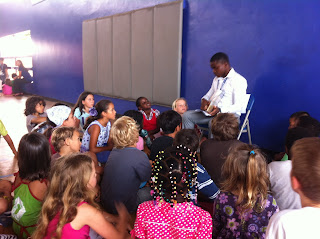2006 was the first time I heard about Real Spelling. In October 2006 a colleague and I from Lincoln Community School, Accra, attended a residential course on Real Spelling, and soon after our school adopted this inquiry based teaching approach to spelling. We had professional development from Real Spelling and from Pete Bowers from WordWorksKingston.
This week three teachers lead workshops on Real Spelling as part of out teacher Growth and Goals sessions at LCS. This, along with my students' inquiry into the word hypnotic this week, lead me to write this post and share with you my children's theories along with my theories, to find out the word sum of hypnotic and to share with you the kind of inquiry Real Spelling can lead to.
During my students' book club discussion, I overheard them talking about the word sum of hypnotic. They came up with some theories but this particular trio didn’t really know what the next steps were. So, we brought it to the class when the Book Club was over and asked for their theories.
Straight away the children were able to say it was a Greek word because of the medial y.
Two of my Real Spellers informed me that 'Hypnos' was a Greek God. Being quite ignorant about Greek Gods this was news to me, but great news! The boys suggested it comes from a base word meaning to sleep. and said that being hypnotised is like being asleep.
They came up with some theories such as hype +note +ic as they justified that –ic was a suffix and they thought that hype might be a base element used in hype + not +ic and the free base element hype, although they couldn’t make a connection between that and ‘sleep’.
We originally came up with some theories that it was:
hyp +no +tic hypn+o +tic hype +not +ic
One of my EAL students suggested that yes, o could be the connecting vowel.
Sadly the children and I ran out of time for our discussion and we were still no near having hard evidence to support our theories.
I then did what a girl’s got to do. I Skyped Real Spelling.
Real Spelling then subtly suggested :
There's evidence from hypnic and hypnoid.
I then asked whether -tic is a suffix as well as –ic and suggested that in gene +tic, -tic seems to be but struggled to come up with other ideas.
Real Spelling then suggested that I look at mesmerise.
He told me that was an eponym, which I didn’t know and found it very interesting reading about Mr Mesmer and his mesmorising animal magnetism!
http://en.wikipedia.org/wiki/Franz_Mesmer
So I put the letter string ‘otic’ into the word searcher ( an extremely useful tool for fidning evidence for your theories: http://www.neilramsden.co.uk/spelling/searcher/index.html
and came up with the following list: erotic, exotic, quixotic, chaotic.
Once I started investigating www.etymonline.com I put in chaotic and it conformed my earlier theories about the relationship between erotic, chaotic and exotic . All of these come from Greek bases and all of which seem to have –otic as one otic or 2 , ote + ic suffixes.
eros +tic and maybe the s became assimilated over time, as did the s in chaos + tic exo +tic
So maybe it is hypno + tic and –tic is a suffix usually added to Greek bases?
Real Spelling had already given me the suggestion that and were words so that seems to clarify that the base word is definitely coming from the Greek word to sleep.
| -otic | -osis | -oticism |
| hypnotic | hypnosis | hypnotism |
| erotic | | eroticism |
| exotic | | exoticism |
|
| |
| biotic | biosis | |
| osmotic | osmosis | |
| neurotic | neurosis | |
| psychotic | psychosis | |
But then, what about hypnotize? I know that -ize and its British counterpart -ise are suffixes but - tize? When I looked up more words in the hypn word family I also realized that not all the words had an o following the base e.g. hypnotherapy, apart from hypnagogic , so either the o is a connecting vowel, or part of a suffix, it is definitely not part of the base element.
Or is it hypn + ote + ize?
Hypn + osis and hypn + otic don’t allow for hypnotize or hypnotherapy or hypnotism.
Although various online dictionaries tell me that –otic is a Greek adjectival suffix, I still can’t see how that leads us to hypnotise, unless that is a back formation from hypnosis so I have 2 options for hypnotize and hypnotic and I think that hypnotherapy must have a connecting vowel, as does hypnagogic
|
hypn (sleep) | ote | Ize Ic Ism ist
| s |
| otic osis otize | | |
| o | therape | y ist |
So I sent my theories off to Real Spelling and this is what I got back:
Here you need to understand Greek and Latin word structure, and what constitutes the productive ‘stem’ that is the root of English elements. Such resources as Etymonline assume that you know such thing. You can get an idea of it from a comment in the Word Study film on the spelling of lens (the title is ‘A Mess of Pottage’) that you can view here in the Real Spelling Gallery. The passage in question begins at the 3 minute 50 seconds mark
I had to admit, I still didn’t understand! So I sheepishly admitted that I didn’t and got this reply:
“I don't give answers, as you know - I comment on reasoning and treatment of evidence! The question - and its development - is more important than the answer.
That said, your own investigation took you, as illustrated in your matrix, to these possibilities.
All these are morphologically coherent and consistent; they do imply the existence of a suffix <-ote>. We need to clinch, it, though, by finding at least one attested spelling in which it is actually final - by definition, prefixes CAN be (not "are") final in a word construction. So I do a word search and - yoopeee! - I unearth that shares a base with and the splendid . The suffix <-ose> is attested.
All that's left is this:
It looks as if it might actually be since I do know the suffix <-is>. I need to find an attested occurrence, then, of <-ose>. As yet, however, I haven't managed to find one so my holding position until I do must be to treat -osis as a unitary suffix.”
So the search continues but at least I know the suffixe –ote! It was a long investigation but I learned and relearned a lot on the way. It’s not the destination, it’s the journey.
Find out more about Real Spelling and this inquiry approach at:
www.realspelling.com and www.wordworkskingston.com
I am also putting together some resources for my school’s Real Spelling learning community too but it is very much a work in progress:
www.realspellinglcs.wikispaces.com





























